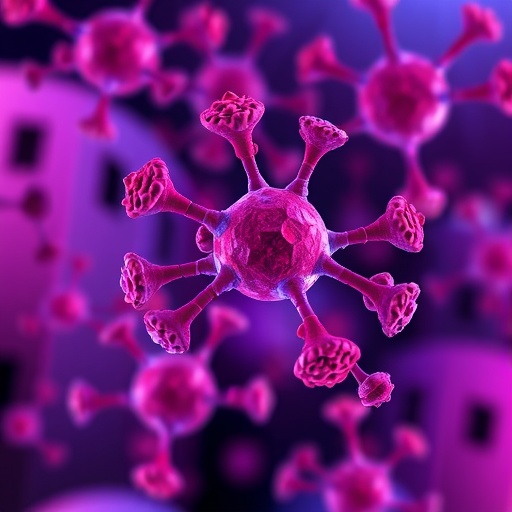In a groundbreaking advancement poised to revolutionize targeted cancer therapies, researchers at the Hebrew University of Jerusalem have engineered a novel drug molecule capable of precision destruction of TERRA, a long non-coding RNA implicated in the survival mechanism of certain cancer cells. This innovative approach utilizes an advanced platform known as RIBOTAC (Ribonuclease Targeting Chimera) technology, which enables selective recognition and degradation of TERRA without collateral damage to healthy RNA within the cell.
TERRA, or Telomeric Repeat-containing RNA, plays an essential role in maintaining chromosome integrity by protecting telomeres—the chromosome end caps that preserve genomic stability. While TERRA’s normal function is critical for cellular health and division, aberrant activity or overexpression has been linked to cancer cell immortality, particularly in aggressive brain and bone tumors. These cancers exploit TERRA’s properties to sustain incessant growth, evading the typical cellular senescence or apoptosis that would naturally curtail malignant proliferation.
The research team, headed by Dr. Raphael I. Benhamou alongside colleagues Elias Khaskia and Dipak Dahatonde at the Hebrew University’s Faculty of Medicine, published their findings in the journal Advanced Science. Their work elucidates the design of a small molecule RIBOTAC capable of homing in on a unique structural motif present in TERRA—a G-quadruplex configuration. This four-stranded nucleic acid structure forms a distinct three-dimensional conformation that the RIBOTAC molecule can selectively dock to, facilitating the recruitment of endogenous RNase L, a cellular enzyme specializing in RNA cleavage.
This pioneering drug operates as a molecular “guided missile,” directing the enzymatic machinery specifically towards TERRA, thereby instigating its cleavage and subsequent degradation. Unlike traditional gene-silencing therapies or protein-targeted drugs, this method ensures remarkable specificity, sparing other similar RNA molecules that share sequence homology but lack the unique G-quadruplex fold. This selectivity dramatically reduces off-target effects, a persistent challenge in RNA-targeted treatments.
Experimental application of the RIBOTAC molecule in cultured cancer cell lines, including HeLa cells derived from cervical carcinoma and U2OS cells representing osteosarcoma, demonstrated a significant decrease in TERRA levels. More importantly, this reduction correlated with a marked slowdown in cancer cell growth, affirming the therapeutic potential of targeting RNA structures unique to cancer biology. The findings suggest that TERRA degradation disrupts the cancer cells’ ability to maintain telomere stability, thus impairing their proliferation and survival.
The utilization of RIBOTAC technology reflects a profound shift in pharmaceutical targeting paradigms—from proteins, which have traditionally been the mainstay of therapeutic intervention, toward RNA molecules as critical regulators and effectors in disease. RNA molecules like TERRA not only encode genetic information but also play regulatory and structural roles that can be exploited for clinical benefit. By leveraging intrinsic cellular pathways, such as RNase L-mediated cleavage, RIBOTACs offer a dynamic, tunable, and highly specific modality to selectively degrade pathogenic RNA species.
Dr. Benhamou emphasized the revolutionary implications of their research: “This is a new era for drug discovery. Instead of focusing solely on proteins, we have opened a pathway to target RNA molecules that orchestrate cellular machinery. This opens the door to treating diseases that have long been deemed untargetable, offering hope for conditions like cancer which have historically challenged existing therapies.”
This discovery not only embodies a triumph in molecular biology and medicinal chemistry but also ushers in a future wherein RNA-targeted drugs could complement or even supplant conventional chemotherapeutics. Unlike broad-spectrum agents that often cause systemic toxicity, RIBOTAC-based drugs promise precision molecular surgery at the genetic root of malignancies, potentially resulting in fewer side effects and improved patient outcomes.
Moreover, the versatility of RIBOTAC technology extends beyond oncology. Since RNA molecules mediate diverse biological processes and are implicated in numerous diseases, the molecular framework developed by the Hebrew University team is anticipated to catalyze a wave of research into RNA-targeted treatments for viral infections, neurological disorders, and genetic diseases.
While exciting, further in vivo studies and clinical trials will be necessary to establish the safety, biodistribution, pharmacokinetics, and efficacy of TERRA-targeting RIBOTACs in patients. However, the initial proof-of-concept provides a compelling foundation for the rapid development of RNA-structured-based therapeutics. This technology exemplifies the power of integrating structural biology, chemical synthesis, and molecular medicine to pioneer selective and potent interventions.
In conclusion, the sophisticated molecular engineering of RIBOTACs to selectively degrade TERRA represents a paradigm shift in cancer therapy innovation. By breaking down a crucial RNA scaffold that supports tumor proliferation, this approach introduces a potent, specific, and novel therapeutic avenue with the promise to overcome resistance and improve durability of anti-cancer responses. The Hebrew University’s achievement heralds a future where the precise modulation of RNA can rewrite the script of disease treatment, moving the field closer to realizing personalized and highly effective medicine. This remains an inspiring testament to the transformative potential of targeting RNA structures for disease eradication.
Subject of Research: Cells
Article Title: RNA G-Quadruplex RIBOTAC-Mediated Targeted Degradation of lncRNA TERRA
News Publication Date: 6-Oct-2025
Web References: 10.1002/advs.202512715
Keywords: RNA, Cancer, Cell biology
Tags: brain and bone tumors treatmentcancer cell immortality mechanismscancer therapieschromosome integrity and cancerHebrew University cancer researchnon-coding RNA researchPrecision Medicine AdvancementsRIBOTAC technologysmall molecule drug designtargeted cancer treatmenttelomeric RNA role in tumorsTERRA RNA elimination





